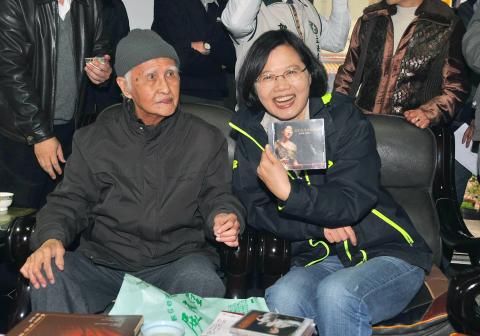|
¡¥Guiding light¡¦ of
folk music Kuo Chih-yuan dies at 92
By Chang Hsun-teng, Ling Mei-hsueh and Jason Pan / Staff
reporters, with staff writer

Former Democratic Progressive
Party chairperson Tsai Ing-wen, right, visits musician and composer Kuo
Chih-yuan in Miaoli County during her presidential campaign in 2011. Kuo died on
Friday.
Photo: Chang Hsun-teng, Taipei Times
Respected musician and composer of many
popular Taiwanese songs and folk music Kuo Chih-yuan (³¢ªÛb) died on Friday, aged
92.
Having been honored by the government as a ¡§National Treasure Musician¡¨ and
referred to by the nation¡¦s cultural and artistic communities as ¡§the guiding
light of modern Taiwanese folk music,¡¨ Kuo dedicated his life to composing
songs, with a good many becoming classics.
Born in Yuanli Town (b¸Ì), -Miaoli County, in 1921, he received his primary
education in Taiwan and in 1935, he went to Japan with his uncle to receive
musical training in Japanese schools from junior high through university. After
World War II, Kuo returned to Taiwan in 1946 to start his musical career.
Kuo wrote and released more than 200 popular songs, many of which are still
loved by Taiwanese and sung to this day. Some of his best-known tunes were The
Crucian Carp is Taking a Bride (ÃV¥J³½±ý°ù¬Y), Go to Sleep, Little Baby (À¦¥Jµt), Red
Baby Rose (¬õëLÁ¨) and A Night Mooring by the Maple Bridge (·¬¾ô©]ªy).
He was also well-known for his versatility as a composer. His compositions
included artistic songs, chamber music, piano concertos, opera songs, orchestral
music and popular music. In addition, he wrote musical scores for Taiwanese
movies and stage shows, as well as ballads and folk music.
According to his family and relatives, Kuo¡¦s health had deteriorated recently
and he was given a preliminary diagnosis of colorectal cancer. Due to his
advanced age, doctors could not do a biopsy.
He received liquid nutritional supplements intravenously in hospital and was
discharged on Wednesday.
On Friday at 11am, his family found him in failing health and rushed him to
hospital. His breathing and heartbeat stopped before arrival and for 40 minutes,
hospital medics tried in vain to resuscitate him, family members said.
Doctors said the likely cause of death was that the cancer spread to his liver,
resulting in organ failure. He was pronounced dead at 12:25pm, with his family
and relatives at his bedside.
Former cultural affairs minister Tchen Yu-chiou (³¯§¨q) said that over the course
of Kuo¡¦s lifetime, he experienced war and other great historic changes in
Taiwan¡¦s political and social environment.
¡§Despite it all, Kuo still harbored a sense of determination to keep producing
his creative works and composing music. He had a very genuine and deep passion
for Taiwan, the land and its people,¡¨ she said. ¡§Kuo¡¦s lifetime work laid the
foundation for Taiwan¡¦s musical legacy.¡¨
|
![]()
![]()
![]()